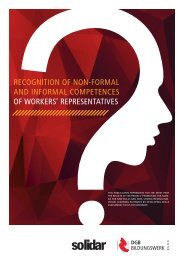domestic workers: decent work for all â south africa - Solidar
domestic workers: decent work for all â south africa - Solidar
domestic workers: decent work for all â south africa - Solidar
You also want an ePaper? Increase the reach of your titles
YUMPU automatically turns print PDFs into web optimized ePapers that Google loves.
Subject to the conditions and regulations laid down by law, free medical care is available to<br />
pregnant women, children below the age of six years, and women requesting termination of<br />
pregnancy. Furthermore, <strong>all</strong> persons are entitled to free primary health care services. 39 Due to<br />
pressure on resources, however, the availability and quality of health care services have in<br />
some cases proven to be problematic, especi<strong>all</strong>y in rural areas.<br />
Social insurance<br />
In terms of the Unemployment Insurance Act 40 (UIA), which has been amended to include<br />
<strong>domestic</strong> <strong><strong>work</strong>ers</strong>, social insurance benefits 41 available to contributors or dependants of<br />
contributor are:<br />
• unemployment benefits;<br />
• illness benefits;<br />
• maternity benefits;<br />
• adoption benefits; and<br />
• dependant’s benefits.<br />
While these measures are available to safeguard <strong>domestic</strong> <strong><strong>work</strong>ers</strong> in the event of unplanned<br />
contingencies bef<strong>all</strong>ing them, they are not sufficient. A major problem is that only a minority of<br />
<strong>domestic</strong> <strong><strong>work</strong>ers</strong> are registered with the Unemployment Insurance Fund (UIF). One of the<br />
reasons is that many <strong>domestic</strong> <strong><strong>work</strong>ers</strong> <strong>work</strong> <strong>for</strong> different employers, while a requirement <strong>for</strong><br />
registration is that ta contributor has to <strong>work</strong> a minimum of 24 hours per month <strong>for</strong> a particular<br />
employer. 42 A year after the introduction of SD7 it was found that no more than 25% of <strong>domestic</strong><br />
<strong><strong>work</strong>ers</strong> were registered with the UIF. 43 More recently, a survey 44 revealed that, out of a sample<br />
of some 200 employers, 41.4% (82 in number) had registered their <strong>domestic</strong> employees<br />
although 56.2% indicted that they were aware of SD7. Various reasons were provided by the<br />
remainder <strong>for</strong> not registering the <strong>domestic</strong> <strong><strong>work</strong>ers</strong>, ranging from ―the process is too time<br />
consuming‖ or ―it is not worth the ef<strong>for</strong>t‖ to ―I do not know where to get the relevant in<strong>for</strong>mation‖.<br />
At about the same time, a readers’ poll on a newspaper website 45 revealed that, out of 677<br />
respondents, 48% (327 employers) indicated that they had registered their <strong>domestic</strong> <strong><strong>work</strong>ers</strong><br />
with the UIF and were paying contributions. Significantly, while very few respondents revealed<br />
substantive reasons <strong>for</strong> not having registered their <strong>domestic</strong> <strong><strong>work</strong>ers</strong>, many used the plat<strong>for</strong>m to<br />
voice their grievances against the current government.<br />
Another problem area is the absence of retirement funds <strong>for</strong> <strong>domestic</strong> <strong><strong>work</strong>ers</strong> to accumulate<br />
benefits during their years of service, unless the employer has created one <strong>for</strong> them. If a<br />
<strong>domestic</strong> <strong>work</strong>er leaves employment, no means of support is available other than the older<br />
person’s grant. 46<br />
Remedial action<br />
Against this background a number of initiatives have been taken or proposed to improve the<br />
application and effectiveness of legal regulation in the <strong>domestic</strong> employment sector. In<br />
particular, the following may be noted:<br />
39 Section 4, National Health Act 61 of 2003 read with section 2, Choice on Termination of Pregnancy Act 92 of 1996.<br />
40 Act 63 of 2001<br />
41 The amount of benefits depends on the remuneration of the contributor, ranging from 30.78% of remuneration in the<br />
case of the highest-paid to 58.64% in the case of the lowest-paid: see Schedule 3, UIA. The period <strong>for</strong> which benefits<br />
are payable is limited and depends on the contributor’s length of employment.<br />
42 Section 3, UIA.<br />
43 Tom Hertz Have Minimum Wages Benefited South Africa’s Domestic Service Workers? African Development and<br />
Poverty Reduction: The Macro-Micro Linkage: Forum Paper (2004) at<br />
http://www.wiego.org/occupational_groups/pdfs/South%20Africa_Hertz_Minimum_Wages_<strong>for</strong>_Domestics.pdf (accessed<br />
16 January 2010).<br />
44 Conducted by African Response <strong>for</strong> Social Law Project in mid-2009.<br />
45 Placed on www.iol.co.za on 7 August 2009.<br />
46 Unemployment benefits are only available <strong>for</strong> a limited period and may only be claimed if the employer has dismissed<br />
the employee or is insolvent or a fixed-term contract has terminated: section 14, UIA.<br />
GLOBAL NETWORK 8
















